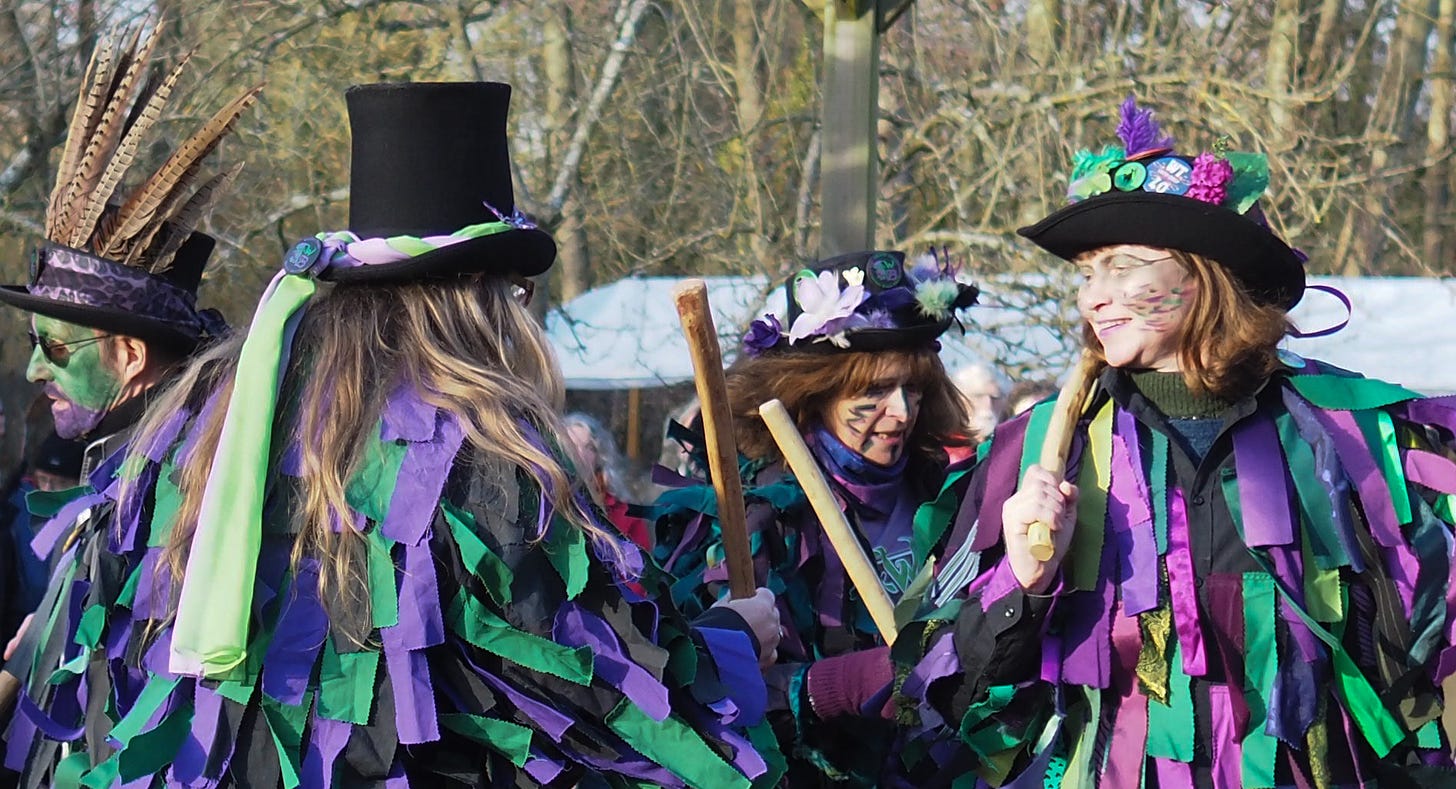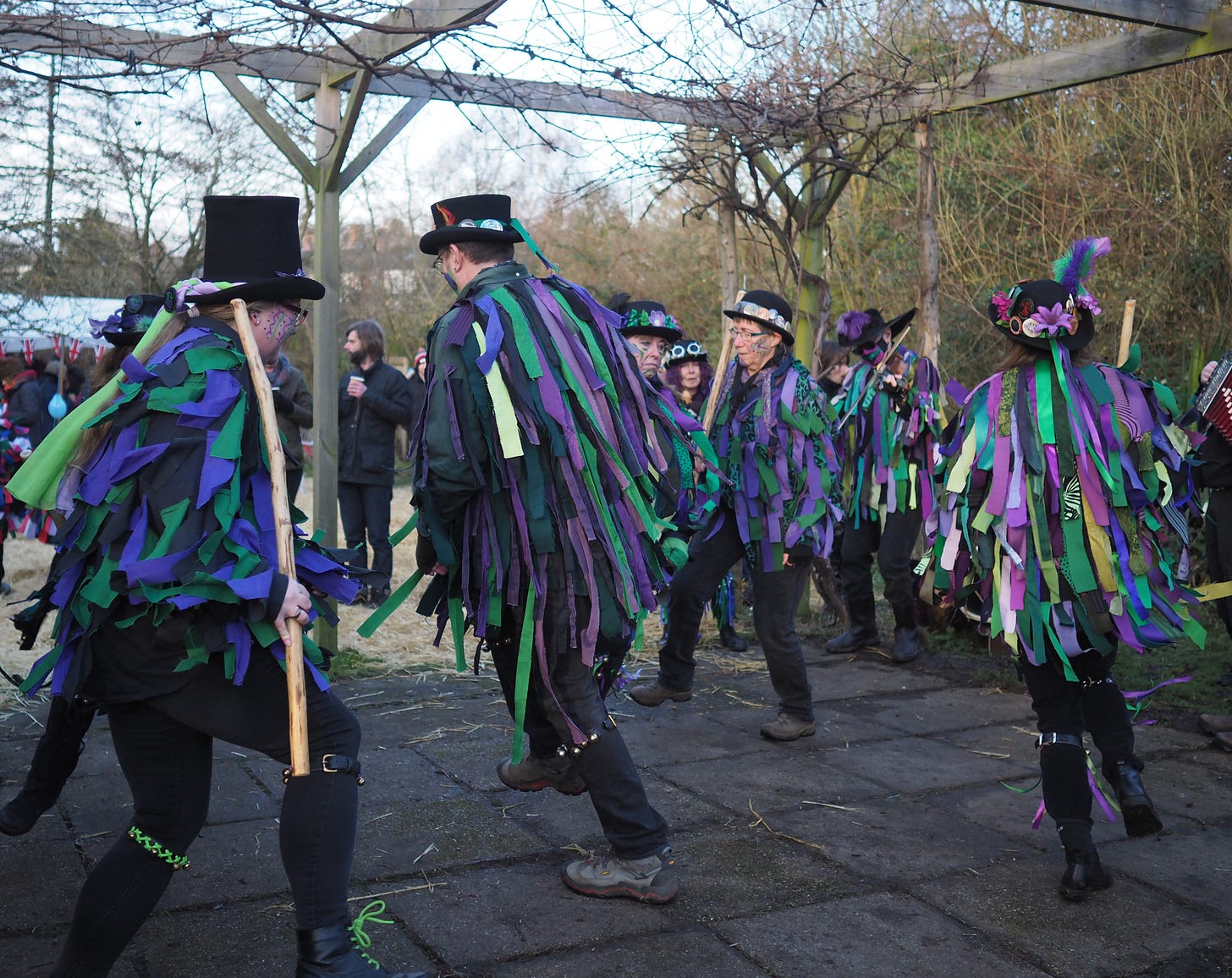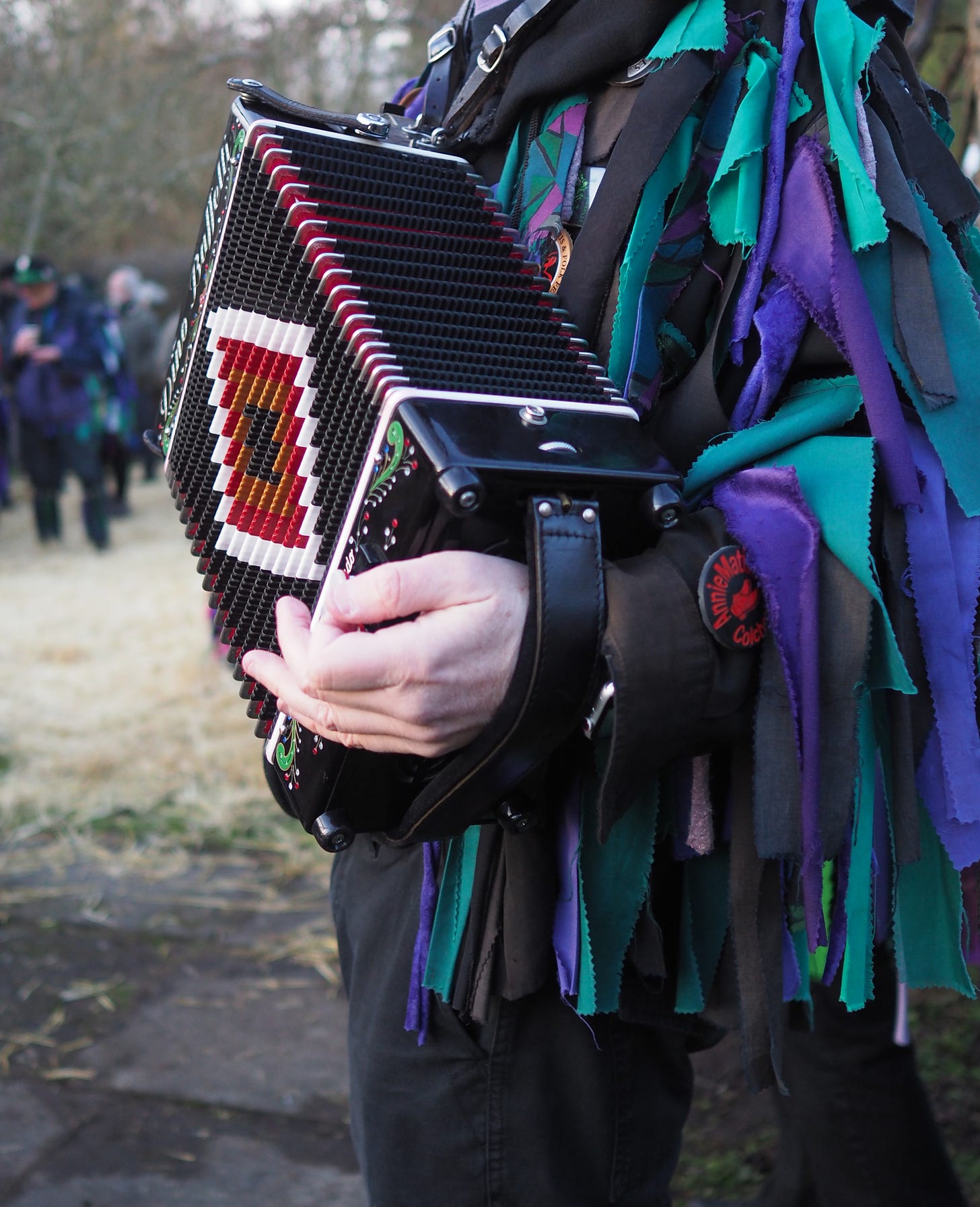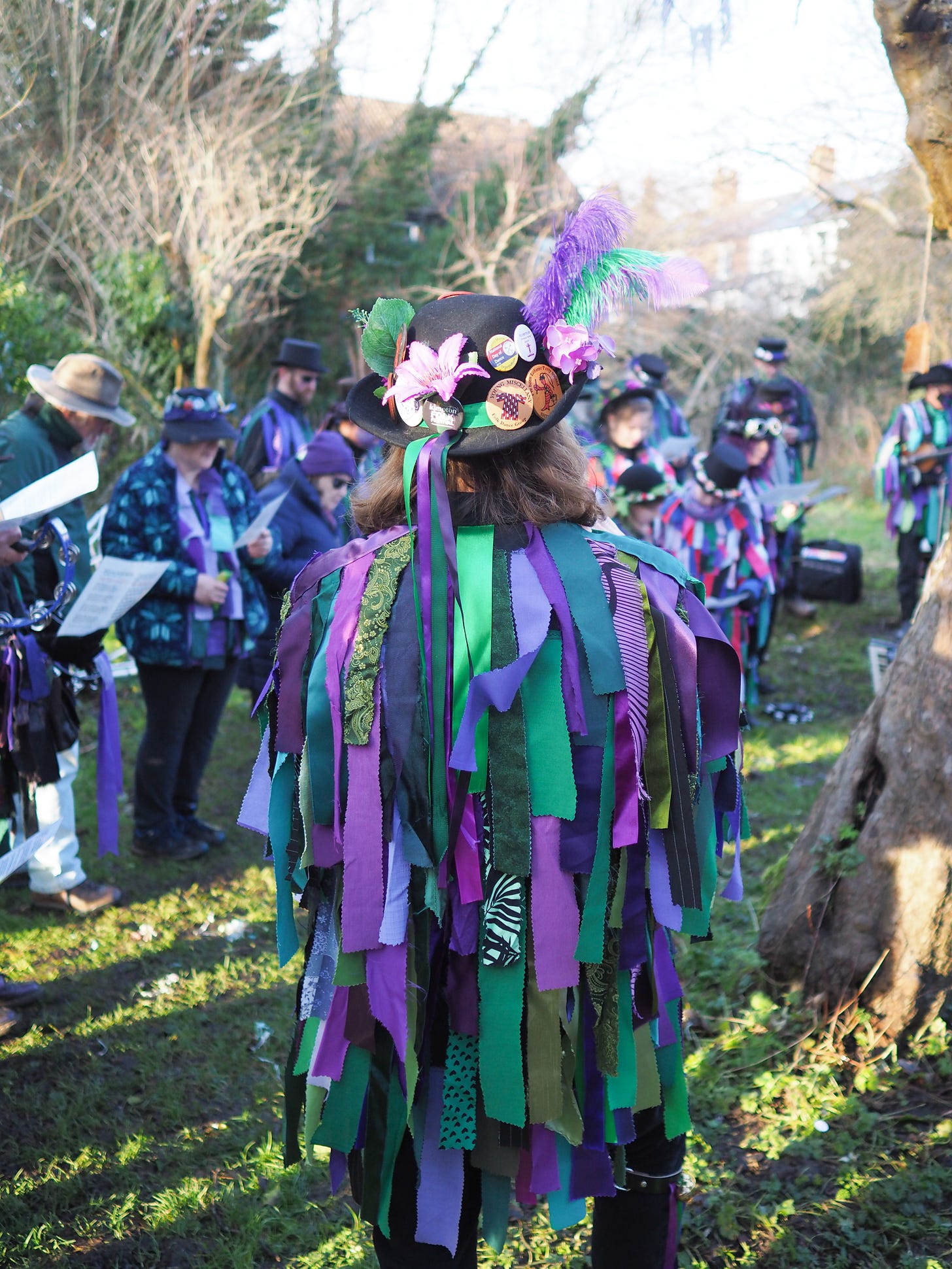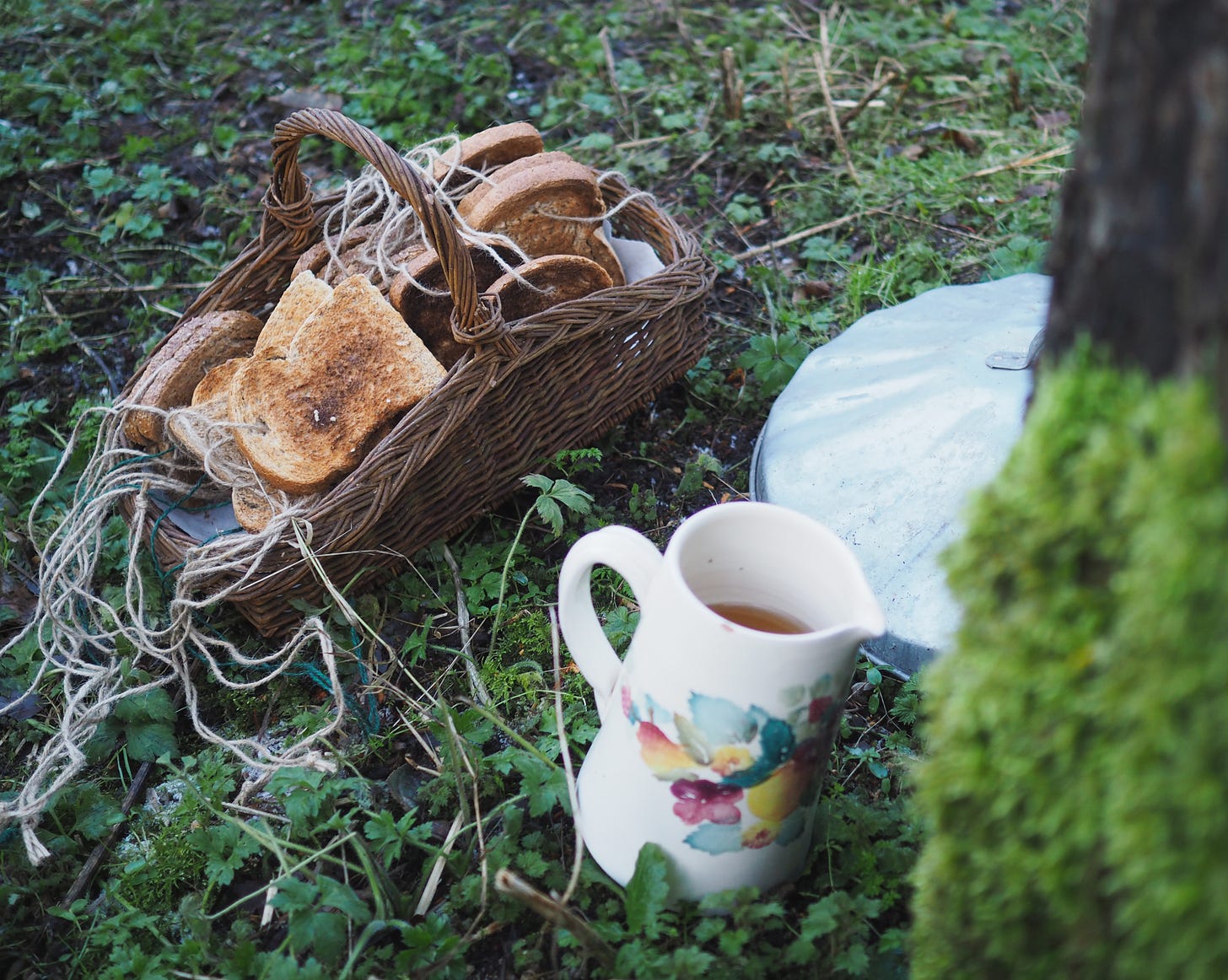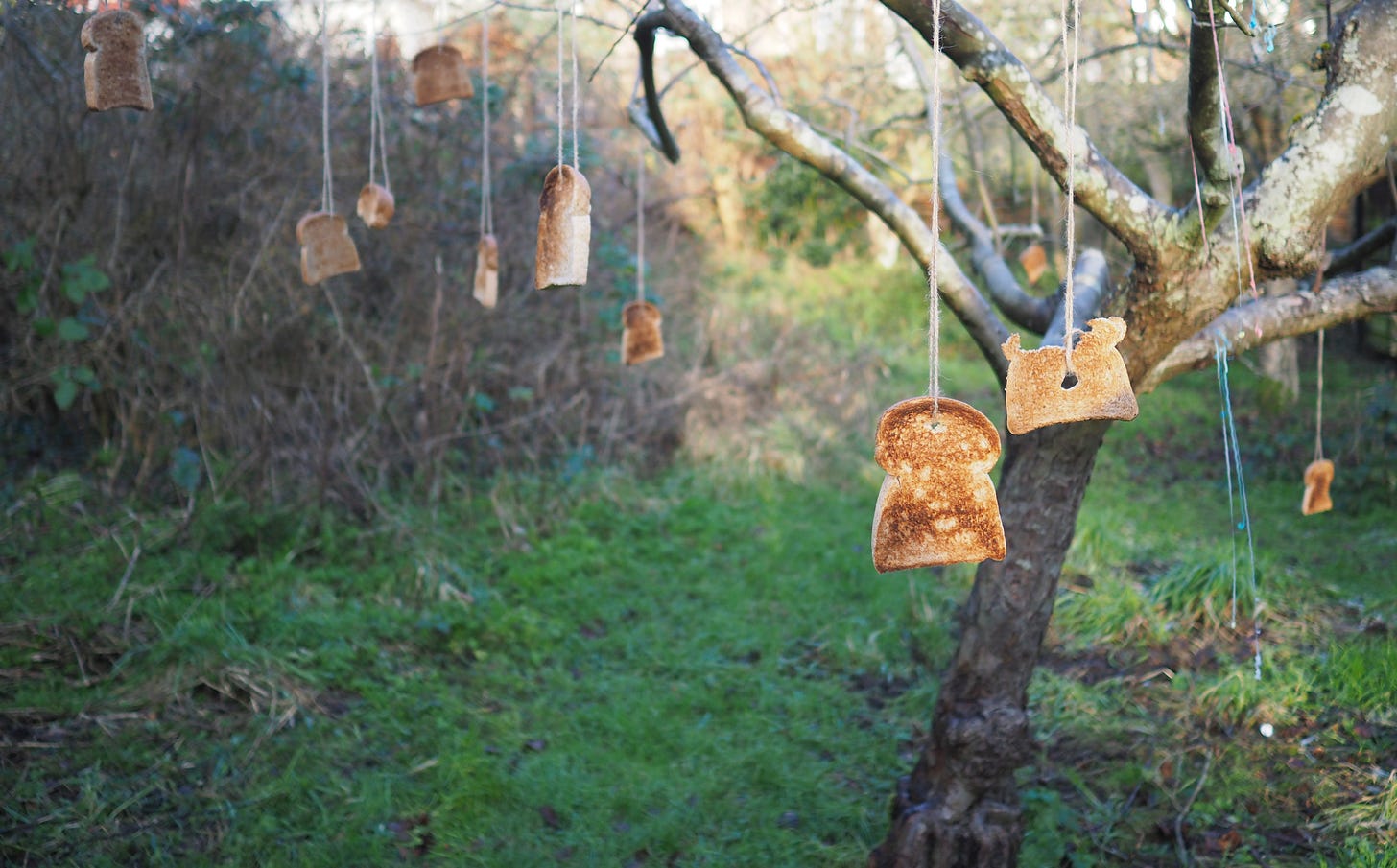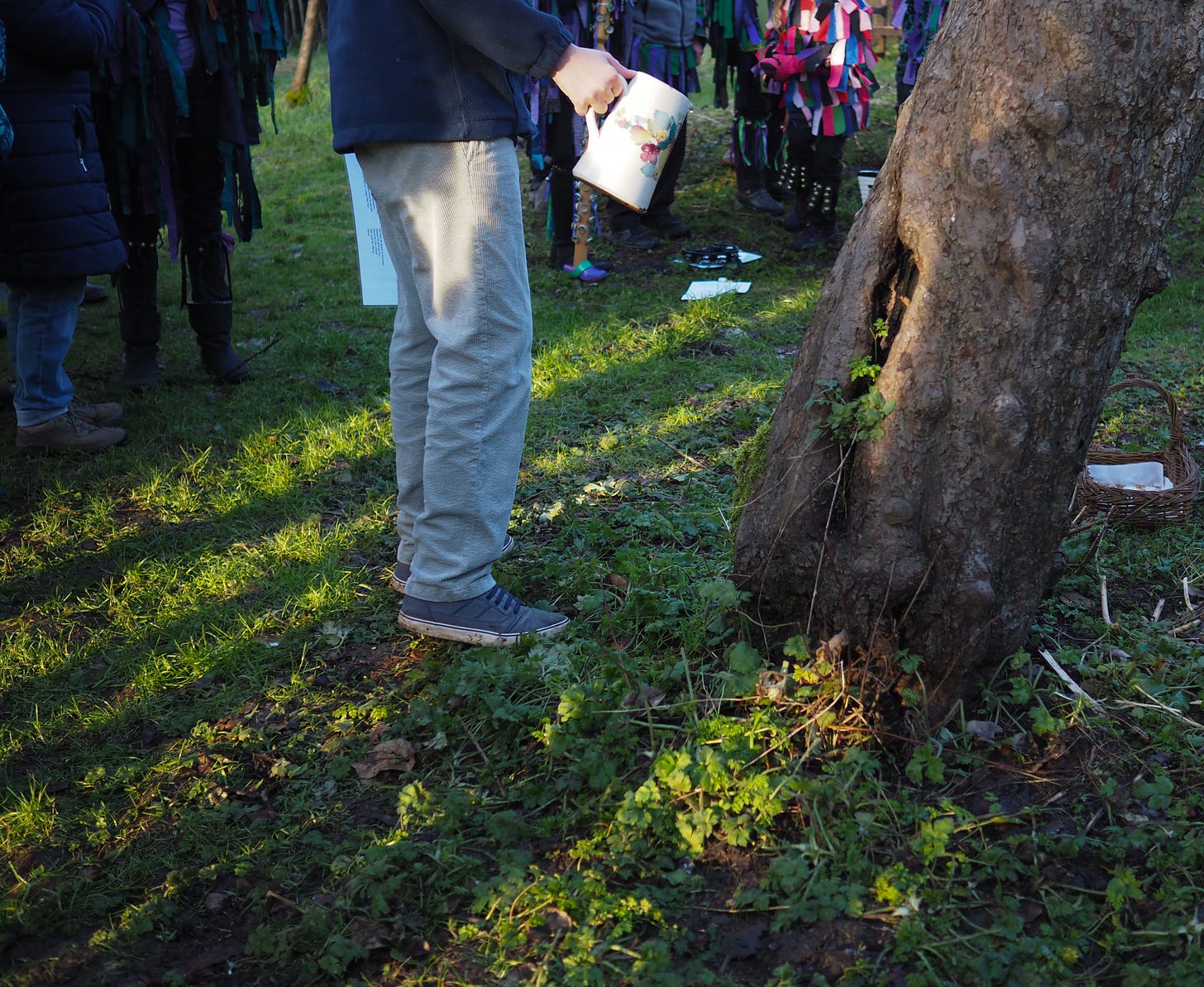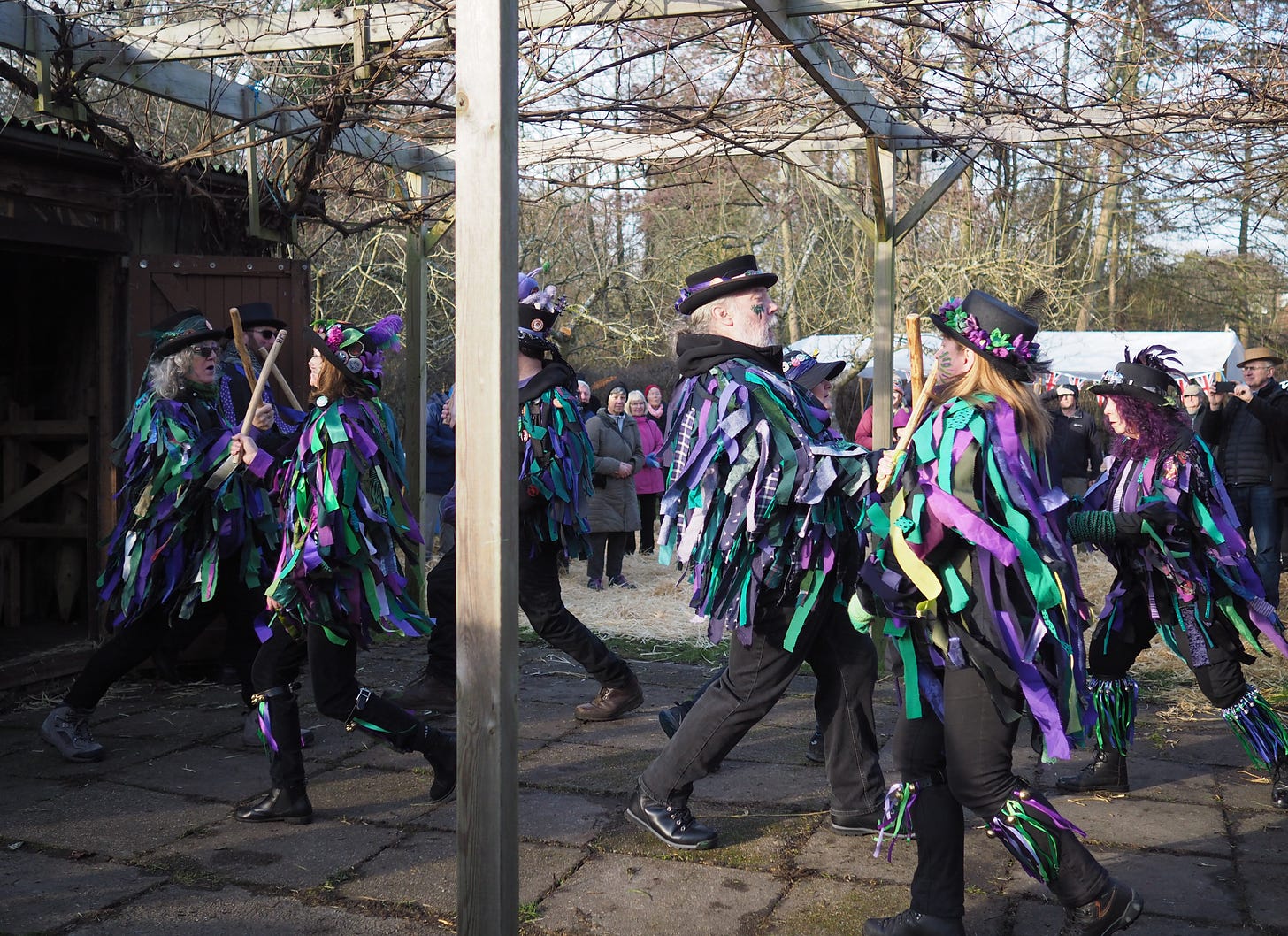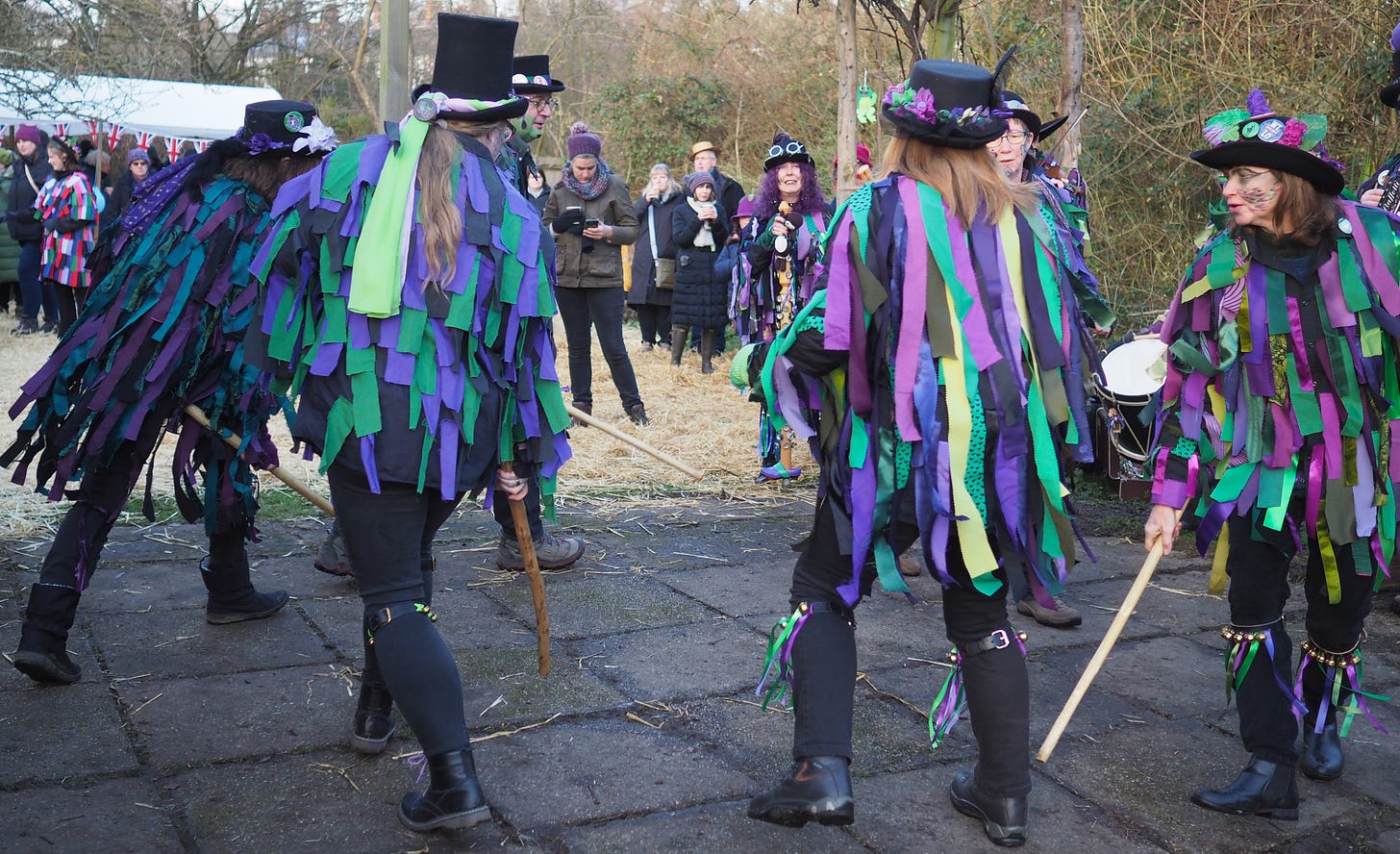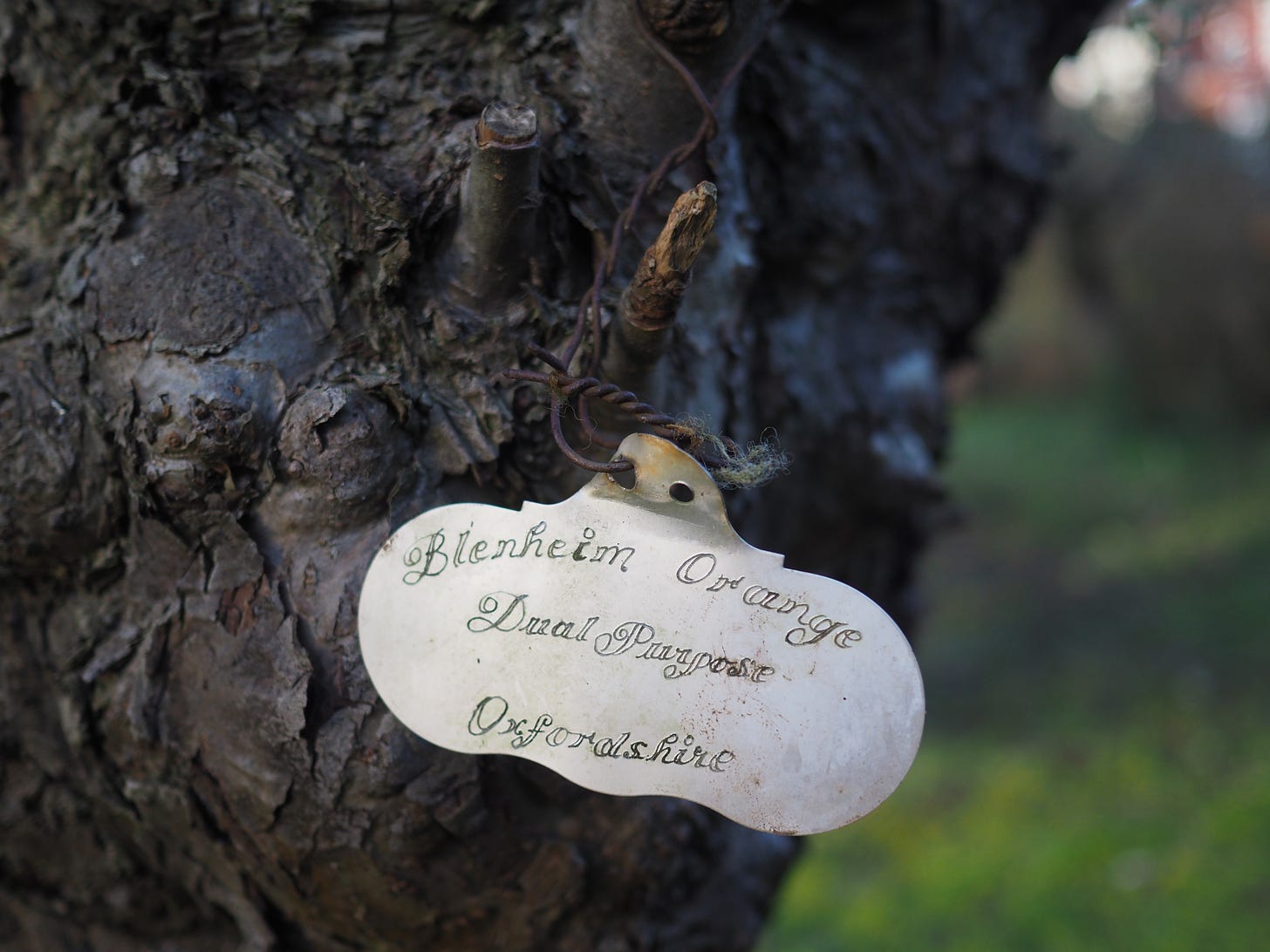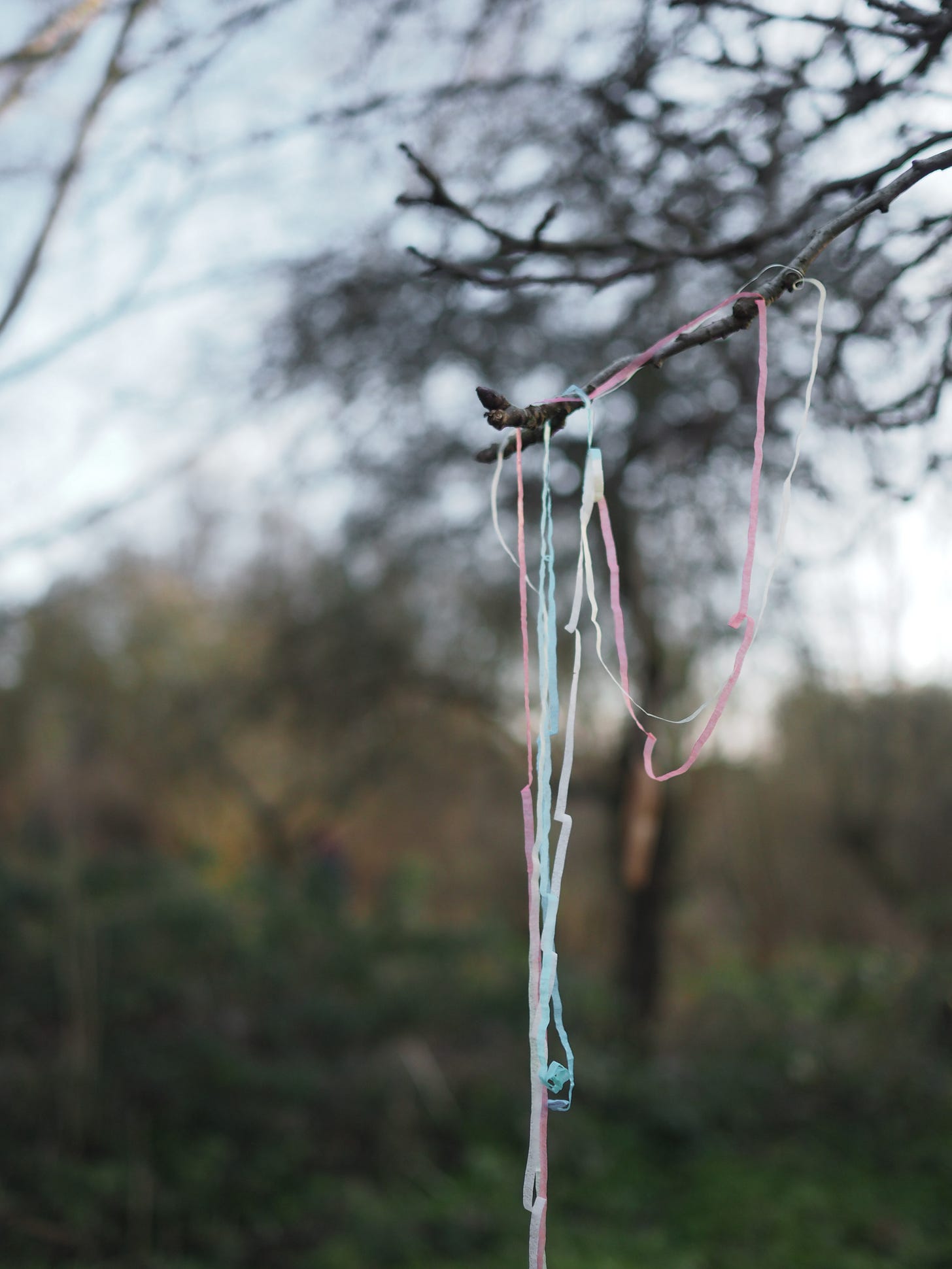Yesterday, I went to a wassail for the first time. Wassailing is thought to be an old pagan ritual and folk custom, celebrated in deep winter and held in orchards to bless apples trees for a plentiful harvest for the next season.
Another type of wassailing is going from house to house bringing songs and good luck in exchange for food or money. Both variations have Anglo-Saxon origins (possibly older) and both are rooted in centuries old midwinter rites. Wassailing took many different forms, depending on local tradition.
The type of wassailing that I’m the most interested in is the blessing of the trees. I’ll talk a little bit about the house to house wassailing later on.
The wassail I attended yesterday was a ceremony to bless the trees to produce a good crop of apples for the forthcoming season. It began with a performance from tatter-jacketed Morris dancers and musicians, at one end of the orchard. This got everyone into a celebratory mood. The dancing was followed by us all carousing behind the musicians in a procession, to the far end of the orchard where the wassail ceremony took place. It was an impressive troupe of dancers and musicians, who played on a variety of instruments – melodeons, accordions, whistles, recorders, saxophone, fiddle, drums, tambourines and other percussion.
Once we arrived in the main part of the orchard, we all gathered around the oldest apple tree there. Before the rituals began, there was a little bit of a historical introduction, (which we were very thankful for, being so new to it). The origins of wassailing were explained, along with the traditions and reasons for them. I love learning about folklore and rituals so I found this as interesting as the dancing and music.
The word wassail is said to originate from the Old English waes hael, meaning “be well” or “be in good health”. It would be said whilst raising a toast, then it would be met with the reply drinc hael, which meant “drink well” or “drink in good health”.
The twelfth night is thought of as the date when wassailing is celebrated. Traditionally, this is "Old Twelvey Night", January 17th, as it would have been before the introduction of the Gregorian Calendar in 1752.
Wassail is also a drink, named for its ritual. Historically, this would have been made with warmed cider, wine or ale blended with spices, honey and occasionally egg, all served in one huge bowl and passed round from person to person. Sometimes a topping of apple, known as ‘lamb's wool’, would be added.
Singing incantations and traditional wassail songs in the orchards was thought to reawaken the apple trees from their winter slumber. So we were all given song sheets, and encouraged to belt out the tunes. There was only one song that I knew, which was the Old Fox Wassail, so I was very happy to see it included.
Old Fox Wassail
Here we come a-wassailing among the leaves so green,
Here we come a wandering so fairly to be seen.
Now is winter-time strangers travel far and near
And we wish you and send you a happy New Year
We hope that all your barley will prosper fine and grow,
So that you'll have plenty and a bit more to bestow,
We hope your wethers they grow fat and likewise all your ewes,
And where they had one lamb we hope they will have two.
Bud and blossom, bud and blossom, bud and bloom and bear,
So we may have plenty and cider all next year.
Hatfuls and in capfuls and bushel-bags and all,
And the cider running out of every gutter-hole.
Down here in the muddy lane there sits an old red fox,
Starving and a-shivering and licking his old chops.
Bring us out your table and spread it if you please,
And give us hungry wassailers a bit of bread and cheese.
I've a little purse made of ratching leather skin.
A little silver sixpences would line it well within,
Now is winter-time, strangers travel far and near,
And we wish you and send you a happy New YearAfter serenading the trees and filling the orchard with music it was time for the main wassail ritual.
Pieces of toast were hung up in the branches of the apple trees to please the spirits already in the fruit trees and to attract more good spirits. It was also to entice robins, who are believed to be the guardians of the orchard and protectors of the trees. Then cider from last year’s apple harvest was poured on the tree roots to wish them “good health”.
For the last part of the ritual, it was time to banish any bad spirits from the trees to ensure a good harvest of fruit next autumn. This was done by making as much of a din as possible. We were given party poppers, and had wooden sticks to hit metal bin lids with, while pots and pans were clattered.
Once the ritual had finished, the musicians and Morris dancers lead another procession back to the other end of the orchard where we stayed for eating, drinking, dancing and more revelry.
After the ceremony, we were given Wassail Punch. It was delicious and certainly warmed our bones after being outdoors for the afternoon. This is my own version. It’s non-alcoholic and it’s blended with honey and spices. For an alcoholic version, just swap the apple juice for cider.
Non-alcoholic Wassail Punch Serves 4 Less than 10 minutes preparation time 20 minutes cooking time Ingredients - 1.5 litres of apple juice - Juice of half a lemon - 6 whole cloves - 4 cinnamon sticks - 1 pinch ground ginger - 1 pinch ground nutmeg - 2 tablespoons of honey - 2 apples Method 1. Warm the apple juice in a pan on a low heat or in a slow cooker. 2. Once warmed, add the spices, honey and the juice of half a lemon. 3. Stir briefly. 4. Gently heat to just about simmering for 20 minutes. 5. After 20 minutes, wash, core and slice the apples. 6. Put 1 - 2 slices of apple in each cup and ladle over the warmed apple juice.
I found a Wassail Incantation online as I was looking for other local wassail events. It seems to have been written more recently, rather than being one of the more traditional verses passed through history. But that doesn’t matter whatsoever. I love it. I think it captures the rites of wassailing rather beautifully.
A Wassail Incantation1
Begone dark spirits from our trees, Begone you bearers of disease, Begone all ill and evil deeds, Take flight this night on smoky breeze. (make lots of noise) Begone all who defile this land, Begone all you with hidden hand, Begone - you will not make a stand! Take flight this night, we so command. (make lots of noise) Blessings to the apple trees, To steady rains and gentle breeze, To healthy blossoms and hungry bees, With our cider, we drink to these. (cheers, whistles, hurrahs) We ask for apples full of taste, We ask for bounty, none to waste, Our Oldest Tree, we now embrace, With our cider, For your grace.
The other wassailing
From the early Middle Ages, at the beginning of each year and ahead of ploughing, villagers would go dancing and singing through the lanes with wishes for good luck and abundant crops for the coming year. It was thought that if the wishes were to take effect, the villagers had to make some sort of sacrifice. So the perambulating spell-worker, would be given food or money on behalf of the villagers, as an offering to ensure there would be enough food to go around.
Throughout the ages, this evolved into villagers going from house to house singing, for luck. These groups of merry-makers, known as wassailers would carry a wooden bowl decorated with holly and ivy. This wassail bowl was used to collect money, or food, or ale, in return for the good luck wishes conveyed by the wassailers’ songs. Sometimes an elder bough, bedecked in ribbon would be carried. This would be an emblem of their standing as luck-bringers. This type of wassailing has largely been replaced by carolling.
Keeping alive the ancient rituals and traditions which encourage a connection and a deep appreciation for our trees and land feels more important than ever. Orchards and woods are disappearing fast and habitats for wildlife are dwindling. Orchards are unique habitats supporting up to 18,000 wildlife species2. Wassailing is a bit of fun, but it’s also an enriching experience, because it provides the opportunity to feel a part of preserving the environment. It might be a very small part, but every nurturing action helps.
If you’re interested in getting involved with your own Local Community Growing Project, here are a few UK links:
The Orchard Project (UK wide)
Racial Justice and Community Orchards
East of England Apples and Orchards Project
The Orchard Network (UK wide)
Community Land Advisory Service (UK wide, managed by Social Farms & Gardens).
https://www.tumblr.com/cidersnob/105143152037/a-wassail-incantation
https://www.theorchardproject.org.uk





